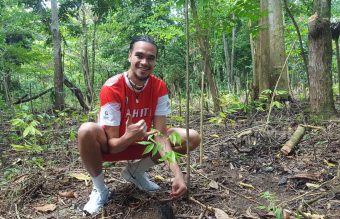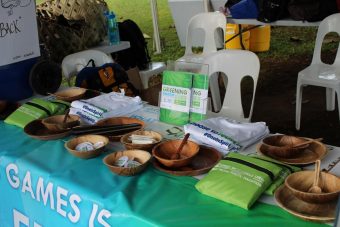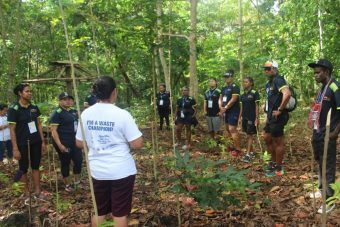
They have been dubbed the “Miracle Games”. After the original host country withdrew, many were wondering if there would be a 16th iteration of the Pacific Games at all in 2019.
Replacement host nation Samoa shouldered the impossible task of organizing the Games in only 18 months. Against all odds they succeeded, making history along the way. The largest Games in the competition’s 56-year history became the stage for some historic achievements.
The two-week event saw a Vanuatan racer win the women’s half marathon wearing only socks and the host country’s Prime Minister become the oldest Games participant in history, competing at archery.
But it was Samoa’s campaign exclude single-use plastics and deliver the first green Pacific Games that set this Games apart from all others that came before.
“There have been attempts to carry this out in previous years, but this is the first time there has been a serious effort by a host country to execute a “green” Pacific Games,” said Kosi Latu, the Director General of the Secretariat of the Pacific Regional Environment Programme and co-chair of the Greening of the Games committee.
Plastic pollution continues to be a major challenge for Pacific island nations. With limited waste management facilities, island nations can often struggle to eliminate the piles of single-use plastic found in most modern packaging. In addition, marine litter discarded in countries thousands of miles away will also find its way to Pacific countries, washing up on pristine beaches and endangering wildlife and ecosystem health in surrounding waters.

By greening the Pacific Games, the quadrennial sporting competition between countries in the Pacific region, organizers were looking to not only protect the environment but also to shift the mindsets Pacific islanders.
“The challenge is really in changing behaviours and one of the ways we can achieve that is by getting people whom we all look up to, to try and set a good example. I think we can all agree that sport is very important to the people of the Pacific, and so using a platform such as this is exactly what we need to try and get our people to change their behaviours,” said Sefanaia Nawadra, head of UN Environment Programme’s Pacific Office.
The 4,000 athletes at the games were all given reusable water bottles in lieu of the usual single-use plastic bottles. Over 300 water stations were erected around the venue where both athletes and spectators could fill up with fresh, clean water. Now that the games have wrapped up, hundreds of these stations will be gifted to local schools for students to enjoy clean drinking water without a need for a single-use bottle.
In addition to eliminating single-use plastic water bottles, there were no plastic or polystyrene plates or cutlery used at any of the venues, dining halls or in the athlete’s village.
Eliminating single-use plastic wasn’t the only way the Games went green. Distances in the Pacific are large, and athletes and officials traveling to Samoa were encouraged to offset their carbon footprints by planting trees in their home countries before they left. A “2 million trees” campaign, organized by Samoa’s Ministry of Natural Resources and Environment, provided anybody attending games a chance to plant a tree.

Rounding out the efforts was a large-scale public information campaign that encouraged Samoans and visitors to keep the island nation clean and plastic-free.
International partners, including the UN Environment Programme and the Governments of Australia, France, New Zealand and the United Kingdom contributed funding of US$153,000 to support the greening initiative.
Samoa and the Pacific region have been taking other steps to protect against marine litter beyond greening the Pacific Games. Pacific countries recently adopted a regional action plan on marine litter. And several Pacific islands have joined UN Environment’s Clean Seas campaign with policy commitments to turn the tide on plastic.
Latu hopes the efforts this year are the beginning of a tradition of greening the Pacific Games. Speaking at a ceremony at the beginning of the games, he said, “Last week I met with the Prime Minister of the Solomon Islands, who will be hosting the next Pacific Games in 2023, and he informed me that they are looking at adopting the same theme of a plastic-free Pacific Games in four years’ time.
“The Samoa 2019 Pacific Games is the catalyst for more environmentally friendly Pacific Games to be held in the future.”
Source: UNEP





